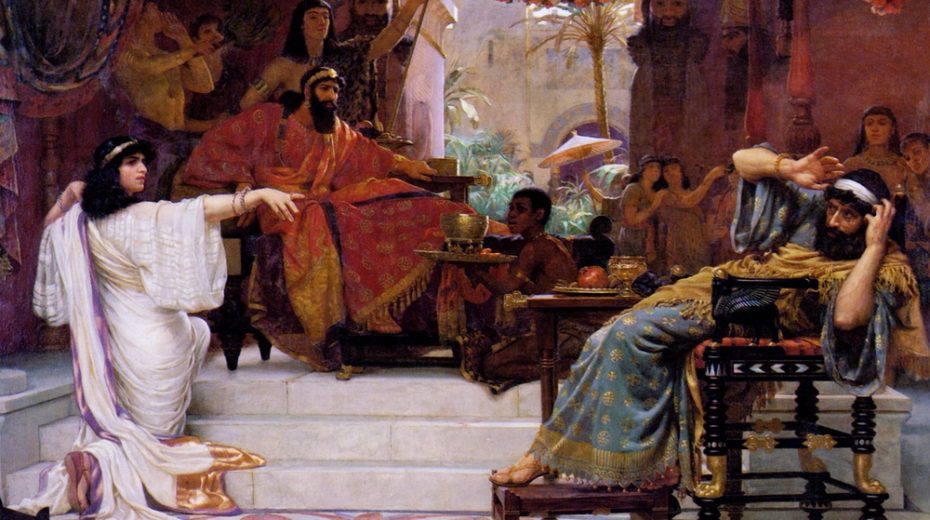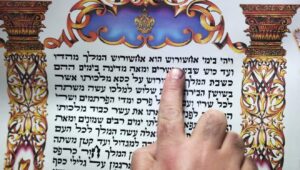The refusal of an independent, free-thinking woman sends the entire Persian Empire into turbulence, and almost a revolution. Vashti stands up to King Ahasuerus and an entire kingdom dominated by men and dares to say ‘No!’ The entire Scroll of Esther then focuses on the king’s response to his wife’s refusal to paraded in front of the goggling eyes of his all-male court.
So the king decides to go looking for a new queen that will obey and a beauty contest begins. The king’s messengers search among all the beautiful young virgin girls in the kingdom and bring them to a “house of cosmetics” where they spend six months in oil baths of myrrh and another six months in aromatic ointments. Only after these preparations were they allowed to show their faces to the king.
Upon entering the kings’ courts, none these young maidens were allowed to return home. After the 12 months of preparation, each girl would usually spend one evening with the king before being sent back to the “house of cosmetics,” unless, of course, the king orders her back for another visit. (Esther 2:12-14)
In any case, these girls became the king’s concubines, with no possibility of returning to their parents’ home. No wonder the king had to send messengers throughout the entire kingdom looking for girls. What parents would want such a fate for their own family.
Enter a woman who can’t say no
Esther is a Persian name that means “hidden” and already we have a curious hint of a concealed mystery the scroll holds. This is the only book in the entire Bible that God himself does not appear even once. It may appear that God is somehow “hidden” in the story, but for those who have eyes to see, He is present throughout, though working “behind” the scenes moving the story forward towards its intended purpose.
Her uncle Mordecai adopts the orphaned Esther in order to protect her, but he cannot keep her hidden from the king’s messengers who bring her to the king’s palace. Esther hides her Jewish origins, yet another reference to the mystery behind her name.
Then wonder of wonders, Esther “finds favor in the eyes” of Hagai, the king’s guard, who then prepares Esther with the best perfumes he knows the king will like. This begs the question: what was it about Esther that caused everyone to like her? It cannot not be merely her exterior beauty, for beautiful women abounded throughout the kingdom.
It must have had something to do with Esther’s obedience. We see that she is willing to do whatever the men around her ask of her. It seems that she has no opinion, ideas, or will of her own. Esther is the opposite of the rebel Vasthi and this is why she “finds favor.” Or is it? Is someone else moving these mysterious events along?
Every man’s dream girl?
Meanwhile, the fate of the Jews is at stake. The king has given Haman permission to enact a law requiring all Jews in the kingdom to be killed. At this point in the story, Esther seems like a superficial and foolish woman. Beautiful and obedient.
When she hears that Mordechai is in mourning over the decree against the Jews and in mourning wearing “sack and ashes,” she is infuriated by the idea and sends him other clothes. How alienated Esther was living in her palace bubble ignoring what’s happening outside the palace walls. When Mordechai sends the clothes back, only then does Esther begin to wake up and realize that a new wardrobe is not what is needed.
Then comes the first time we hear her voice in the story. “And Esther called for one of the king’s eunuchs to find out what was troubling Mordechai.” (Esther 4:5)
Mordechai understands that if Esther is to do something she will need to be pushed and even commanded. So he gives her instructions and tells her to go before the king and entreat him to stop the massacre of the Jews.
But Esther is not willing. She is afraid and fears that she will end up like Vashti if she confronts the king. The very thought of taking responsibility into her own hands is very frightening to Esther. Nothing in her life has prepared her for this situation.
Mordechai then tells her what is to me one of the most powerful verses in the Bible. A verse that puts all faith to the test of truth. A verse that teaches that there are moments in life where you have to take life seriously and decide which way you choose to follow.
Just like during the Holocaust, where good people endangered their lives to save Jews while others chose to do nothing not willing to take the risk. Those who acted are still called “Righteous Among the Nations” and have their names engraved in the history of the people of Israel.
Mordechai tells Esther. “If you remain silent at this time, relief and deliverance will arise from another place.” (Esther 4:14) This pointed declaration is as relevant to all of us today as it was back then to Queen Esther.
In the next chapter we will read about a great upheaval in the life of Esther’s and how it changed her the moment she connected with her life’s mission.















